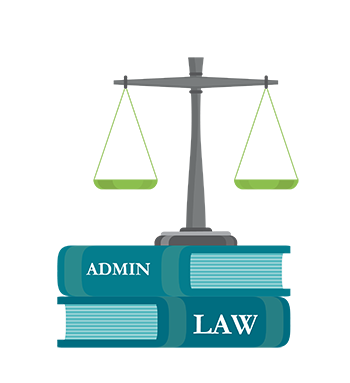What is Administrative law?
Administrative law is one of the lesser known and understood areas of law, but more people come into contact with administrative tribunals than courts.
Generally, Administrative law deals with the relationship between the government and its citizens. Running the government has become more and more complicated. As such, the government has created a multitude of “administrative” or “regulatory” agencies, tribunals and boards to administer various parts of its operation. Administrative law makes sure the actions of these agencies are legal, fair, and reasonable. It also makes sure those affected by the decisions of those agencies have a means to dispute potentially unlawful action.
 Agencies and tribunals make decisions about matters that have a serious impact on people’s lives. For example, the Immigration and Refugee Board of Canada decides whether people running from war torn countries get to stay in Canada as refugees and the WorkSafeBC tribunal enforces workplace safety standards and provides compensation for those injured at work. There are close to a hundred tribunals and agencies operating in BC and they each have their own rules and procedures. The resolution of disputes involving these administrative agencies and tribunals is administrative law.
Agencies and tribunals make decisions about matters that have a serious impact on people’s lives. For example, the Immigration and Refugee Board of Canada decides whether people running from war torn countries get to stay in Canada as refugees and the WorkSafeBC tribunal enforces workplace safety standards and provides compensation for those injured at work. There are close to a hundred tribunals and agencies operating in BC and they each have their own rules and procedures. The resolution of disputes involving these administrative agencies and tribunals is administrative law.
Areas
The primary role of regulatory agencies is to make rules and resolve disputes in their specific area of expertise. There are dozens of provincial, and federal organizations that make regulations and resolve disputes. There are tribunals and agencies for every aspect of the government’s work such as:
- Agriculture
- Employment
- Housing, and
- Immigration
If you disagree with a decision that a particular government agency has made that affects you, a special board (an administrative tribunal) will hear your complaint and make a decision about your case. For example, if a federal government agency has denied you employment insurance benefits when you lost your job, a special tribunal would hear your complaint. A tribunal is sometimes called a “board” or a “commission”. In BC, tribunals are governed by the Administrative Tribunals Act, as well as the acts that created the tribunals, and the internal bylaws and regulations developed by each agency, commission or board.
Different from Courts
Administrative tribunals run parallel to the court system. Although administrative tribunals may resemble courts because they make decisions about disputes, they are not part of the court system.
There are two significant differences between administrative tribunals and courts:
- Administrative tribunals are set up to be less formal, less expensive, and a faster way to resolve disputes than by using the traditional court system.
- Tribunal members who make decisions (adjudicators) usually have special knowledge about the topic they are asked to consider. Judges, however, are expected to have general knowledge about many areas of law, not particular expertise about the law in the case they are hearing.
Steps before a hearing
Every tribunal establishes its own procedures, so you must always contact the particular tribunal to find out which rules you must follow. The rules are usually posted on the tribunal’s website.
Most tribunals follow some or all of these steps:
- A preliminary review – this first review ensures that the correct tribunal is hearing the case. It usually involves the staff reviewing documents and sometimes making a telephone call to the people involved.
- Case management – this step is used to ensure that everyone involved understands what is in dispute and that if a hearing is needed, it can run smoothly. Case management usually involves some discussions between the parties and an adjudicator about how the case will proceed and is sometimes used along with mediation or a settlement conference.
- Mediation or settlement conference – this step helps the parties agree on a solution without the need for a tribunal hearing. A single tribunal member usually conducts these meetings.
- Hearings – a hearing is where the parties can present their cases to the tribunal members who will make a decision. The hearing may be based on written submissions or in person before the tribunal members. It is held if the dispute cannot be resolved through any of the steps described above.
How are Administrative tribunals established?
Tribunals are normally created by federal or provincial legislation or through municipal bylaws. For example, the Employment Standards Act (provincial legislation) creates the Employment Standards Tribunal, which makes decisions about issues that concern employees in BC. Professional associations, such as the Law Society of BC or the Institute of Chartered Accountants of BC, create their own tribunals or boards to resolve complaints from members of the public.
Who are the decision makers
The government or other group that establishes the tribunal usually appoints decision makers generally known as "adjudicators". As a general rule, adjudicators are selected because they have expertise or technical knowledge about the matters they will be reviewing.
Adjudicators hear and decide cases brought before the tribunal. A case may be heard by one adjudicator sitting alone, or by a panel of several adjudicators if the matter is complicated. The adjudicators are responsible for conducting fair hearings by considering evidence and applying relevant legislation, case law, and policies. While the adjudicators have special training and experience to conduct hearings, they are not judges.
Limits on tribunals
Each tribunal is created by a statute. They can only do what the statue says they can do. If they do something else the Courts may reject their decision.
Tribunals must follow proper procedure when making decisions. Usually, the statute will set out the procedure the tribunal must follow. The Courts reject the tribunal’s decision if they do not follow the correct procedure.
The tribunal also has a duty of fairness. This is a very important principle of administrative law and the Courts may reject their decision if they find that they were not fair. The level of fairness depends on the tribunal and the seriousness of the issues it deals with, but in general to be fair:
- The process must be fair
- The parties have a right to know the case and respond
- The adjudicator cannot be biased
- The adjudicator gives sufficient reasons for their decisions in serious cases
In general, the more serious the issue, the closer the tribunal’s procedure and fairness requirements should be to that of a court.









